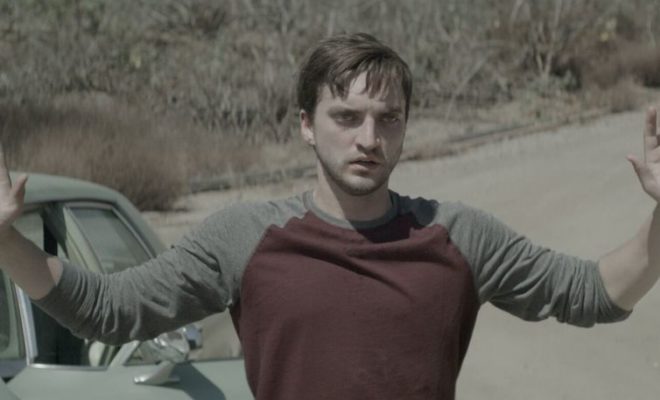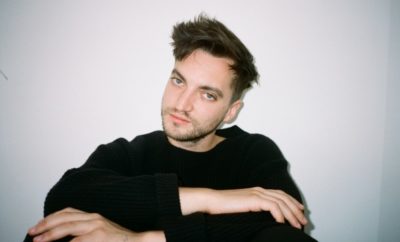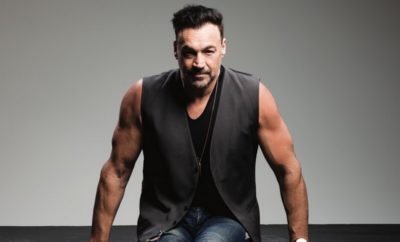
Interviews
Richard Harmon – Darkness Falls
By: Lisa Steinberg
Q) When you first heard about this film, then subsequently began to dive more into the script, what about the story or the project itself really resonated with you?
A) When I was reading it, I was trying to figure out where my character and where Gary Cole’s character are coming from. When I read it, I was like, “These guys are just horrible people. Horrible, horrible people.” There was this, for lack of a better term, this toxic masculinity about both my character and his. That was what drove me towards it. I was like, “This has to be shown.” Someone’s got to play the bad guy to be vanquished and that’s been a big part of my career. [laughs] Someone’s got to be vanquished. It was another good opportunity to be that bad person that people just want to see brought down a peg. Now whether or not we get brought down a peg, you’re going to have to give it a buy or a rent to find out.
Q) You do play these really gritty, gray area characters so damn well.
A) Thank you. Well, I try. That’s the thing with this guy, there might be a little gray to him for sure strictly because I don’t know how much of a choice my character had in any of the matters. He was raised by his father to be this person, it’s sort of that nature versus nurture. If you’re nurtured that aggressively for such a long time, I mean, I became the person that my father wanted me to be in the movie.
Q) I was going to ask, what is it about their dynamic that fuels their devious behavior and dastardly deeds, but it’s really learned responses.
A) Yeah, it’s learned. Yeah. Whereas for Gary’s character, he’s such a brilliant actor and I would never want to speak for Gary and his character, but I think for him it’s definitely he’s running the show between the two of them, for sure. I am a person who never really had the childhood that at least most of us are used to, and he has been completely molded to be this kind of killing machine.
Q) The movie has such a hypnotic electric adrenaline rush as we see these characters delve deeper into their darkness and their bad behaviors. What kind of challenges and boundaries did this really push for you?
A) It definitely pushed them. We are doing things…Again, I don’t want to give anything away, but we are doing things that to me as a human, and I am sure Gary as well, are irredeemable. These are irredeemable acts that we are committing. So, it’s always kind of tough when you do that, but it almost makes you feel more connected to your own humanity because you just don’t want to lose it when you’re doing all of these horrible things. I think you are constantly checking on the other people on set and constantly doing those things. Julien [Seri], our director, and everybody really made the set feel very safe and comfortable to do these sorts of things that are very, hopefully out of the norm, but are no completely out of the norm. These horrible things happen. Someone has got to show it.
Q) It really drives a lot of the pace of the film as well. How do these choices, or lack thereof, help to set the pace and push for the film just as much?
A) I think pacing wise, it was our brilliant director. It was Julien, honestly. He had his vision of how this film was going to go and how it’s going to run. It’s going to be through the anxiety of Shawn’s character and how we are sort of methodical with Gary and I’s characters, the pacing of it kind of switches depending on who you are following. Which I think is great, and that was all Julien’s doing.
Q) The cinematography and the coloring that we see throughout the film really plays so well interlaying the suspense, intensity, and all of these themes that we see within this high-octane movie.
A) Yeah. That’s the thing, it’s such a different sort of way of shooting a film. I had never done a movie, or a TV show for that matter, that is shot the way that Julien decided to shoot it. There was very little coverage. You probably noticed that. There is very little coverage. Most scenes are done in very minimal amounts of shots that felt like he knew exactly what kind of shots that he wanted to do. It was sort of like acting in the middle of a painting kind of thing. Which was an incredibly cool experience and was unlike anything I have ever done up to that point and still to this point.
Q) That’s a really spot on way to describe it, acting within a painting. These colors really add to and amplify the mood and emotional elements we see.
A) It’s like a painting where you are like, this is what’s happening, and you guys like stay within the frame because this is happening.
Q) There are these great gradients that really come into play that he makes us feel so much as the voyeur. We end up feeling as though we are crawling out of our skin and on the edge of our couches during these really horrifying moments. It’s a testament to Julien for sure.
A) Good. Good. It’s all a testament to him. I give all of the credit to him.
Q) The movie teams you up with Gary Cole who is, as always, a nonstop powerhouse dramatic deliverer. What nuances and lessons did you really learn from working with such a veteran?
A) I mean, that’s the thing, in every situation that you ever get as an actor you have to be learning or you are not growing. So, from Gary that was very easy for me. When I found out it that it was him who was playing the father…Because that was one of my first questions when I first came to work on it. Do you know who’s playing the dad? They were like, “Gary Cole,” and I was like, “Done. I am in.” That’s such a dream to be able to work with someone like him who is such a veteran and such a professional. He is all of those things on set. Such a pro. Unbelievable actor as well. You can see it in pretty much anything that he does. Working with him we had a really good time and my kind of thing is that I tried to keep that set as light as I could in between takes. I think I got him to crack a couple of times which meant the world to me.
Q) You two have this really amazing interplay that we get to see throughout the movie that you seem such an extension of each other.
A) That’s the thing, my idea is that I wanted it to be like I was just an extra set of hand for his character. I am the extension of him and he has it so instilled in me that I don’t even need to talk and he doesn’t need to talk to me. Just a look is all it needs to be and my character will immediately know what he needs to do. I am just an extension of his depravity kind of thing.
Q) With regards to your character, we really see this great complexity at his core where the writing really elevated and highlighted his dimensions and moral compass, and lack thereof, so sharply.
A) There are two different characters for me in the film. One is when I am with my father and he’s this sort of machine that is calculated, and like I said an extension of Gary’s character. Then, when he is not around, he’s a kid. He’s never had this childhood. He’s only been able to do this kind of thing with his father. That’s been his entire life. He doesn’t have friends. He’s just been an extension of his father’s horrible deeds his entire life. When his father is not with him, you see the pressure that exists on him to make his own decisions and how hard that is for him to make his own decisions because he is unaware of how to process it. He doesn’t know how to do that. He becomes a little more childlike is what I wanted. He’s a little more childlike and is prone to throwing tantrums. That’s when he can really be at his most dangerous because he doesn’t have his father to make the decisions for him. He’s not capable of making the right decisions.
Q) You talked about this light heartedness that you tried to intersplice while filming such heavy scenes. How did you really shake these emotions and heaviness off at the end of the day peeling those layers away?
A) As a young actor I remember doing “The Killing” and I was eighteen years old, so it sort of felt like to be a good actor you had to stay in it and it had to be hard to shake off. That was always what you would hear – “It’s method. It’s all these things.” I realized after that that it doesn’t always have to be that way. You have to be able to put it away. It doesn’t make you a better actor that you couldn’t get rid of the character at the end of the day. I don’t think that intrinsically makes you better. I mean, I know a lot of people who have that and that’s totally fine. I realized myself that I don’t think that it is helping me as an actor, or as a human, to carry these things home with me. I have gotten pretty good. I have also been lucky to play so many of those dark characters that you would have brought those home with you. So, over time I think I have just gotten used to being able to just drop it.
You can focus up in between takes if it’s a very hard scene. Those times I will generally use my ipod at that point and put on music and just remain to myself. But if it’s not, then yeah, you have to choose the right time to be light and funny. I think it’s appreciated if you do it well and you don’t make too much of a racket and distract other people too much.
Q) Is there anything else about the film that we didn’t touch on that you want to make sure we mention?
A) We haven’t really talked about Shawn [Ashmore] and I just wanted to say he’s fantastic. Everything I say about Gary, it’s the same thing I would say about Shawn in a different way. There are two different ways, but they are both absolute professionals who came in and Shawn was so invested in that character and I think that really comes across. I would just like to personally mention how great I think Shawn is in it.
Q) The way that he tapped into such emotional rawness and absolute anguish and driven devastation we see. It’s exceptional.
A) Yeah, he was terrific.





You must be logged in to post a comment Login